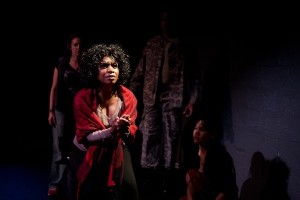“Goliath” is a 45-minute whirlwind about war, the damage and trauma that it causes and the toxic aspects of American culture that fuel that combination. First written, directed and performed by Stanford students in 2007 as a Ram’s Head Original Winter One Act, “Goliath” garnered national acclaim as a college theater piece before finding new life over the past two years in New York City. It returned to Stanford this week for one night only at Pigott Theater on Monday — and I only wish it could have stayed longer.

In a poetically jumbled chronology that jumps between times, places and character perspectives, “Goliath” — under the direction of original playwright Takeo Rivera ’08 M.A. ’09 and original director Alex Mallory ’08 — focuses on David, the main character, as he lives out his story. In the opening scene, we see David write pained letters home from Iraq, and we hear his mother’s explanations of David’s good and gentle nature. We learn more, however, when we see David’s father criticize his manhood and force him to enlist. The story becomes more ideologically complex when we see David’s politically oriented sister’s anti-war rallies and when David refuses his fiancée’s touch upon returning home from his tour. Before we know it, we’ve seen David become numb to the deaths of his fellow soldiers, and we are forced to look on as he participates in the gang rape of a young Iraqi teen while on duty.
The play is unceasingly brutal in its critique of modern culture. Each scene is swirling with social issues — from racism, xenophobia and the myth of the American dream to violent hyper-masculinity, the degradation of women and a nation’s ignorance of the truths of war practices overseas.
At one point in the play, a drill sergeant spits into the face of young cadets, demanding that they fight the Iraqi enemy or else risk “No more hot dogs! No more Fourth of July! No more big titty blond women! No more Sylvester Stallone movies!… I drown weakness with my seminal fluid! I am the epitome of masculinity!” “Goliath” is sometimes grotesque and sometimes hilarious. Yet it is also always difficult, and often too true, too painful or too close to home to even watch.
Dubbed “poetic theater,” “Goliath” inhabits a new kind of theater space in which slam poetry, kinetic storytelling, Greek chorus and theatrical realism all collide. Nothing happens in order, no character narrates the story for more than a scene or two and lines are often repeated or said in unison. Actors slip in and out of different characters or blend into the background, while all physical movement is heightened to what often feels like modern dance. The ensemble cast pushes and pulls through unrelenting subject matter like a wave.
The play brought war and the issues surrounding it vividly to life, and gave the audience a reason to become more vocal on such issues. The return to campus of a production with such strong Stanford roots — Rivera noted that he wrote the majority of the original script over a weekend in Green Library — for a revival showing sets a positive tone, moreover, for the creation and production of more works like “Goliath” on the Farm.
